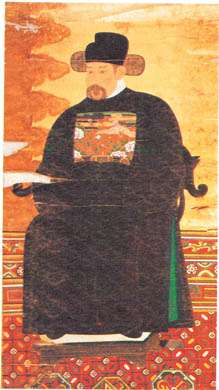Yun Hyu
Yun Hyu (윤휴; 尹鑴, 1617 – 1680) was a Korean Joseon Dynasty politician and Neo-Confucian scholar, poet. Yun was the political leader of the Southern (Nam-in) faction of the Joseon Dynasty. His courtesy name was Baegho[1] and Haheon, Yahbo.
| Yun Hyu | |
 | |
| Korean name | |
|---|---|
| Hangul | 윤휴 |
| Hanja | 尹鑴 |
| Revised Romanization | yun hyu |
| McCune–Reischauer | yun hyu |
| Pen name | |
| Hangul | 백호, 하헌, 야보 |
| Hanja | 白湖, 夏軒, 冶父 |
| Revised Romanization | Baegho, Haheon, Yabo |
| McCune–Reischauer | Baekho, Hahŏn, Yabo |
| Courtesy name | |
| Hangul | 두괴, 희중 |
| Hanja | 斗魁, 希仲 |
| Revised Romanization | Du'goe, Huijung |
| McCune–Reischauer | Tukoe, Hŭijung |
| Posthumous name | |
| Hangul | 문간 |
| Hanja | 文簡 |
| Revised Romanization | Mungan |
| McCune–Reischauer | Munkan |
He was nominated to be a Jipyeong (持平, 지평) as a Yebinshijeong (禮賓寺正, 예빈시정) and had served in various other posts, before he left politics to absorb himself in scholarly pursuits.
In 1660 he became a leading figure in the controversy regarding the mourning rituals over King Hyojong.[2] In 1674 he became involved again in a second round of the controversy, this time over the death of Queen Inseon. In 1680 he was ordered to commit suicide by King Sukjong after a long public debate with Song Siyeol.[3] In 1680 Yun Hyu was expelled and exiled to Gapsan (甲山, 갑산) and that year sentenced to death and executed.
Works
- Baekhojeonseo (백호전서, 白湖全書)
- Baekhodokseogi (백호독서기, 白湖讀書記)
- Juryeseol (주례설, 周禮說)
- Hongbeomseol (홍범설, 洪範說)
- Jungyongdaehakhuseol (중용대학후설, 中庸大學後說)
- Jungyongseol (중용설, 中庸說)
- Baekhojip (백호집, 白湖集)
See also
- List of Korean philosophers
- Korean philosophy
- Heo Mok
- Song Si-yeol
- Yun Seon-do
- List of Korean language poets
- Korean literature
- List of Korea-related topics
References
- Lankov, Andrei (1990). "Controversy over Ritual in 17th Century Korea". Seoul Journal of Korean Studies. 3: 49–64.
- Lankov, Andrei. : 53. Cite journal requires
|journal=(help); Missing or empty|title=(help) - Miura, Kumio (1985). "Orthodoxy and Heterodoxy in Seventeenth-Century Korea: Song Siyol and Yun Hyu". In de Bary, Wm. Theodore (ed.). The Rise of Neo-Confucianism in Korea. NY: Columbia University Press. pp. 411–444 [436].